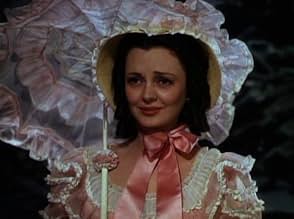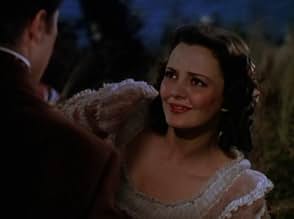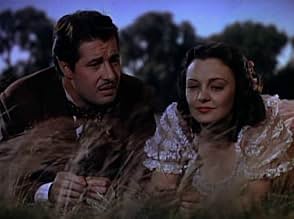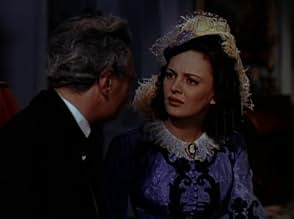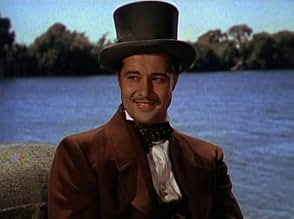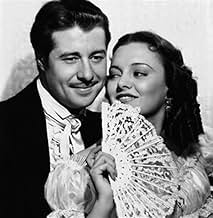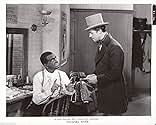Füge eine Handlung in deiner Sprache hinzuMore fictional than factual biography of Stephen Foster. Songwriter from Pittsburgh falls in love with the South, marries a Southern gal (Leeds), then is accused of sympathizing when the Civ... Alles lesenMore fictional than factual biography of Stephen Foster. Songwriter from Pittsburgh falls in love with the South, marries a Southern gal (Leeds), then is accused of sympathizing when the Civil War breaks out.More fictional than factual biography of Stephen Foster. Songwriter from Pittsburgh falls in love with the South, marries a Southern gal (Leeds), then is accused of sympathizing when the Civil War breaks out.
- Regie
- Drehbuch
- Hauptbesetzung
- Für 1 Oscar nominiert
- 1 Gewinn & 1 Nominierung insgesamt
Empfohlene Bewertungen
It's just not P.C. to show all that blackface any more, let alone the condescending approach to black people. (When Foster has ripped off "Oh Susannah" from a slave work song but is stuck on the last line, Jeannie--she of the light brown hair fame--comments that she's grown up among black music, their simple culture..."Hmmm...Here's how I think the Negroes would end it." Bingo, smash hit.) "Swanee River" is no great shakes as a movie, but it's a shame that people can't see it because of cowardice.
Foster was the first American composer of lasting merit (although his contemporary Louis Moreau Gottschalk came close). His compositions were totally composed by him (including lyrics). But he never had any business abilities, so that while tunes like "Old Folks At Home", "Beautiful Dreamer", "The Camptown Races", "I Dream of Jeannie" and "Oh Susannah" were massive popular hits, Foster got remarkably little of the profits. Added to his problems were the lack of efficient copy-write protection in the U.S. (or on the globe, for that matter) to prevent pirating of his work. He was also the first composer who tried to live on the successful profits of his compositions. Had he been frugal, and not a drinker, it just might have worked (for a few years he did prosper), but he fumbled it. His last years were spent still composing, but living as a Bowery derelict. His end is not quite the melodrama of the film - he fell in his room cutting himself (not cutting his throat). Due to his alcoholic condition weakening his body, he died a few days later in Bellevue Hospital.
Don Ameche is a terrific actor, and does what he can here - but it reminds us of an extended development of his Edward Salomon (Lillian Russell's doomed composer husband) in the Russsell biography. He is talented - greatly so - but drink and ill health doom her here. No new extension of his acting range as Foster.
By 1939 I wonder if there was increasing criticism by African - American groups regarding stereotyping in Hollywood. Probably not too much yet, or at least enough for the industry to take notice. Films about D.D.Emmett (DIXIE), and other films with minstrel segments in them would still appear within the next decade. It really is not until the end of the 1940s and into the 1950s that an effect of World War II is felt - a dislike for the disparate treatment of African Americans - and begins to have an impact. So the minstrel portions, historically correct (unfortunately), were totally acceptable in this film in 1939.
Oddly enough, given the accidental tragedy that ends this film, the fate of E.E.Christy is overlooked. Christy apparently had a nervous breakdown in the 1860s, and threw himself out of a window. One would not know that watching Jolson's performance, based on this script.
The concluding moment of this film always stuck in my craw. Tragically announcing the death of Foster at what was supposed to be the benefit to resurrect his career, Christy/Jolson announces the first performance of Foster's latest and greatest tune. He starts singing "Old Folks At Home" (renamed "Swanee River" - as in the film title), Jolson starts singing it (remember for the first time). When the music reaches the chorus, "All the world is sad and weary..." the whole audience arose and sang it's chorus lines. Remarkable example of massive psychic transference, or poor screenplay writing: I leave it to the viewer to guess which.
While SWANEE RIVER is more of a fictional essay than fact, and what Hollywood bio-pic isn't, overlooking inaccuracies such as Foster's last complete composition actually being "Beautiful Dreamer" instead of "Swanee River" as the screenwriters of this story depict, the movie holds interest during its 85 minutes. Accurate in its period costumes, SWANEE RIVER is given lavish Technicolor, the charm of Andrea Leeds, and the rich singing voice of Al Jolson. Sadly for the legendary Jolson, who is in excellent form both in acting and singing (mostly in black-face), this became his last movie as a featured performer. The comedy routines for the minstrel shows, which wouldn't work as entertainment today, are lavishly staged and reproduced from that by-gone era.
Of the 200 completed songs written by Foster, only a few were selected. The musical program includes: "Here Comes the Hevan Line" (sung by Negroes); "Beautiful Dreamer" (background score); "Oh, Susanna" (sung by Al Jolson); "Camptown Races," "My Old Kentucky Home" (sung by Don Ameche and Al Jolson); "Ring, Ring de Banjo," "I Dream of Jeanie With the Light Brown Hair," "Old Black Joe" and "Swanee River" (sung by Jolson).
In the supporting cast are Chick Chandler as Mr. Bones; Felix Bressart as Henry Kleber; George Reed as Old Joe; Diane Fisher as the Foster daughter, Marion; and The Hall-Johnson Choir.
Don Ameche is believable as Stephen Foster, but even today, this life story of Foster is overshadowed by his earlier and most famous role in 1939's THE STORY OF Alexander GRAHAM BELL. Out of circulation for quite some time, if SWANEE RIVER should ever resurface again on any cable channel, chances are it won't be from American Movie Classics, where it was once scheduled and pulled in 1991, but possibly on the Fox Movie Channel during the early morning hours. For now, SWANEE RIVER, available on DVD, lives in the memory of those fortunate to have seen it many years ago. (***1/2)
Wusstest du schon
- WissenswertesThe penultimate on-screen performance of Al Jolson.
- PatzerThe film's final scene is wholly inaccurate; there was no performance by E.P. Christy on the day that Foster died. In reality, Christy actually died nearly two years before Foster; he committed suicide by throwing himself from a window at his home in New York City in May 1862; Foster himself died in January 1864.
- Zitate
Stephen Foster: [he whistles a version of Oh! Susanna] That ending isn't right yet.
Jane McDowell Foster: You know, I think the Negroes would finish it like this
[she whistles the tune]
Stephen Foster: Why, that's right! How did you know?
Jane McDowell Foster: You forget, I was brought up on Negro music.
Stephen Foster: I wish I'd been. As I boy in Pittsburgh, I heard just enough of it to want to hear more. I'd a colored nurse you know. Sometimes, she'd take me down to their little church by the river, I heard "Sweet Chariot", "Roll Jordan", all the rest.
Jane McDowell Foster: There's nothing like them, is there?
Stephen Foster: No. They have something all their own. It's... well, it's music from the heart. From the heart of a simple people. That's why it moves you like it does. And by jingo, it's the only real American contribution to music. I wonder...
Jane McDowell Foster: Wonder what?
Stephen Foster: Why no one's taken the trouble to write it down; to develop the material and compose original music in the same mood.
Jane McDowell Foster: Well, why don't you, Stephen?
Stephen Foster: Why don't I? Well, why don't I?
Jane McDowell Foster: You can, I'm sure. You have a wonderful feeling for it.
Stephen Foster: If I do, it'll be your fault. You'll have to take the blame for it. Because you'll be the music. You'll be all the songs I'll ever write. Without you, I don't think I could write them. I think they'd just, well they'd just die.
Jane McDowell Foster: Then we mustn't let them die.
- Crazy Credits[prologue] This is the strange story of a Northern youth to whom the Southland brought immortal inspiration.....Though his stormy life is long forgotten, his simple words and simple music live on in the hearts of the whole American people.
- VerbindungenReferenced in Tot oder lebendig (1942)
- SoundtracksCurry a Mule
Written by Sidney Lanfield & Louis Silvers
Top-Auswahl
Details
- Erscheinungsdatum
- Herkunftsland
- Sprache
- Auch bekannt als
- Swanee River: The Story of Stephen C. Foster
- Drehorte
- Produktionsfirma
- Weitere beteiligte Unternehmen bei IMDbPro anzeigen
Box Office
- Bruttoertrag in den USA und Kanada
- 285.100 $
- Laufzeit
- 1 Std. 24 Min.(84 min)
- Seitenverhältnis
- 1.37 : 1

